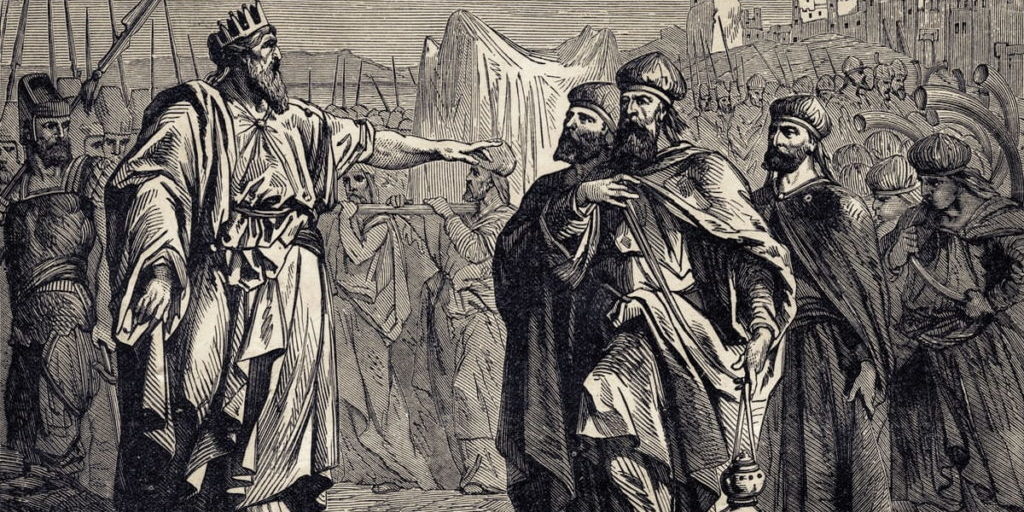
How to Read Kings Theologically
The Books of 1 and 2 Kings introduce us to the study of theology through what is primarily narrative. 1 Kings includes administrative records (ch. 4), letters (ch. 5), building descriptions (ch. 6-7), and prayers (ch. 8), but the larger context remains the narratives of the royal houses of Judah in the south and of Israel in the north and of the divine engagement with those houses through the prophets. They extend from the last days of David until the coming of the destruction of the two kingdoms, with Judah surviving the longest, until the Babylonian invasion and destruction of 587/586 BC. In examining this fascinating account of the history of Israel’s monarchy, the reader will benefit by looking for the following themes.
The Sovereign God
The foremost theme in these two biblical books concerns the reign of the single God of Israel who is sovereign over them and Creator of the world. He requires sole loyalty and worship. The story of Kings is the account of the manner in which rulers and prophets succeeded and failed in this requirement. Focal points in the sovereignty of God and the response of others include the failure of Solomon in 1 Kings 11, the conflict with the false god Baal worshipped by Queen Jezebel and King Ahab (1 Kings 18), and the destruction of the Northern kingdom of Israel in 2 Kings 17.
Despite King Solomon’s faithfulness toward God in requesting a listening heart (1 Kings 3) and God’s gift to him of great wisdom, wealth, and political power; Solomon’s many marriages (probably diplomatic moves to secure power in a human manner) to foreign wives turn his heart toward other gods and their worship. Consequently, God sent his prophet to declare that Solomon’s successors would lose the empire and most of the original land of Israel, preserving only the tribal territory of Judah (the tribe of David and the dynasty in Jerusalem) and of Benjamin.
1 Kings 18 emphasized the great contest between hundreds of the prophets of Baal, supported by Ahab and the royal house of Israel, and the single prophet Elijah, supported only by the true God. The victory, after each side was called on their deity to send fire from heaven and consume the sacrifice, belonged to Elijah. Following the divine fire came a great rainstorm that ended the years of drought and gave the people hope for a great harvest and the blessing of abundance after starvation conditions. The slaughter of the priests of Baal demonstrated the uncompromising nature of God’s covenant relation with his people.
2 Kings 17 recounted the narrative of the north’s destruction and deportation with a lengthy theological interpretation that the ultimate failure of the Northern Kingdom of Israel was due to the refusal of the dynasty and of the country to serve God alone. Despite God’s sending of prophets to warn all the inhabitant with words of power and with miracles, they refused to hear. They worshiped other gods and goddesses, instead. All of this led God to permit the Assyrian armies to ravage the land bringing death and deportation of the survivors (especially those in and around the capital of Samaria) far away to other lands from which they would not return and in which they would lose their identity as people of God’s covenant. Much of the land of Israel was repopulated with foreigners who worshipped other gods.
The reader of 2 Kings may learn from such events. The experiences of the destruction of the northern Kingdom and the history of judgment against the apostate kings of the south (scattered through 1 Kings 12 – 2 Kings 16), was intended to warn the southern kingdom of Judah of a similar judgment if they followed other gods. 2 Kings 17-25 detail how Judah responded and the results. The faith of King Hezekiah, in worshiping only Israel’s God and in abolishing many other forms of worship, prepared him to face the Assyrian threat (2 Kings 18-20). He prayed to God who responded with a miraculous deliverance. The boastful Assyrian king was murdered by his own sons while Hezekiah was given full recovery from a severe illness and an additional fifteen years of life. The reader can see the dramatic contrast between the living God of Israel who delivers his people and the powerless deities of the mightiest military force of that age.
Hezekiah’s son Manasseh turned from God and eagerly pursued the worship of other gods (2 Kings 21). His son Amon reigned briefly and followed in his father’s footsteps. It was only when the young boy Josiah became king that faithfulness returned (2 Kings 22:1-23:30). Josiah renovated the temple of Jerusalem which had not been used for the worship of God during Manasseh’s reign. The discovery of the ancient scroll of God’s law led to a reformation that blessed the land and preserved if from divine judgement during Josiah’s life. His successors, however, turned back to idolatry. Judgment resulted with the destruction of Judah and Jerusalem’s temple (2 Kings 23:31-25:21). The leaders were killed or deported. Even the local governor established by the Babylonian king was murdered and the survivors fled to Egypt (2 Kings 25:22-26), reversing God’s salvation of his people from Egypt so long ago.
God’s Faithfulness to Covenant
In the midst of much judgment the reader will find the theme of God’s faithfulness to his covenant with Israel and his promise to bless others. This dual work appears at the opening of 1 Kings where king David cannot keep warm and ultimately dies (1:1 – 2:10); yet not before guaranteeing his successor Solomon as ruler. Despite Solomon’s sins, his construction and dedication of the temple with a prayer seeks to make it a center of prayer where faithful Israelites can find God’s blessing (ch. 8) but also where non-Israelites may pray so that God’s answer and blessing will lead them to faith (8:44-53). The failure of so many kings leads to the rise and work of the major prophets Elijah and Elisha. 2 Kings begins with these prophets (1:1-8:15), whose works of national salvation and international intervention (chs. 1, 3, 5, 6:8-7:20, 8:7-15) intersperse with personal works of healing and ministry (chs. 2, 4, 6:1-7, 8:1-6) that anticipate Jesus’ miracles in the gospels (also in the north and to non-Israelites; cf. Luke 4:25-27). God miraculously preserves Jerusalem and Hezekiah (2 Kings 18:1-20:11) while foreshadowing the Babylonian destruction of the city during a lapse in Hezekiah’s faithfulness (20:12-21). He also blesses faithful Josiah and holds off for more than two decades on the promised destruction of the Southern Kingdom.
The reader will also benefit by noting how God preserves the line of the Messiah. God’s covenant with David (2 Samuel 7) continues. Neither David’s death, nor the division of the kingdom, nor the destruction of the Assyrians and of the Babylonians succeed in ending the line. Even when Athaliah, from the apostate family of Ahab and Jezebel, becomes queen in Jerusalem, her attempt to kill all of David’s descendants fails (ch. 11). The infant Joash is hidden until the time is ripe for a rebellion against Athaliah. He becomes king and the line continues. Despite God’s judgment against Jerusalem and his own temple, he preserves the messianic line in Babylon. The story ends noting that Judah’s captive king Jehoiachin was released from prison in Babylon (25:27-30). The line of David through Jehoiachin (also called Jeconiah) will continue up to Jesus the Messiah (Matthew 1:11-16).

